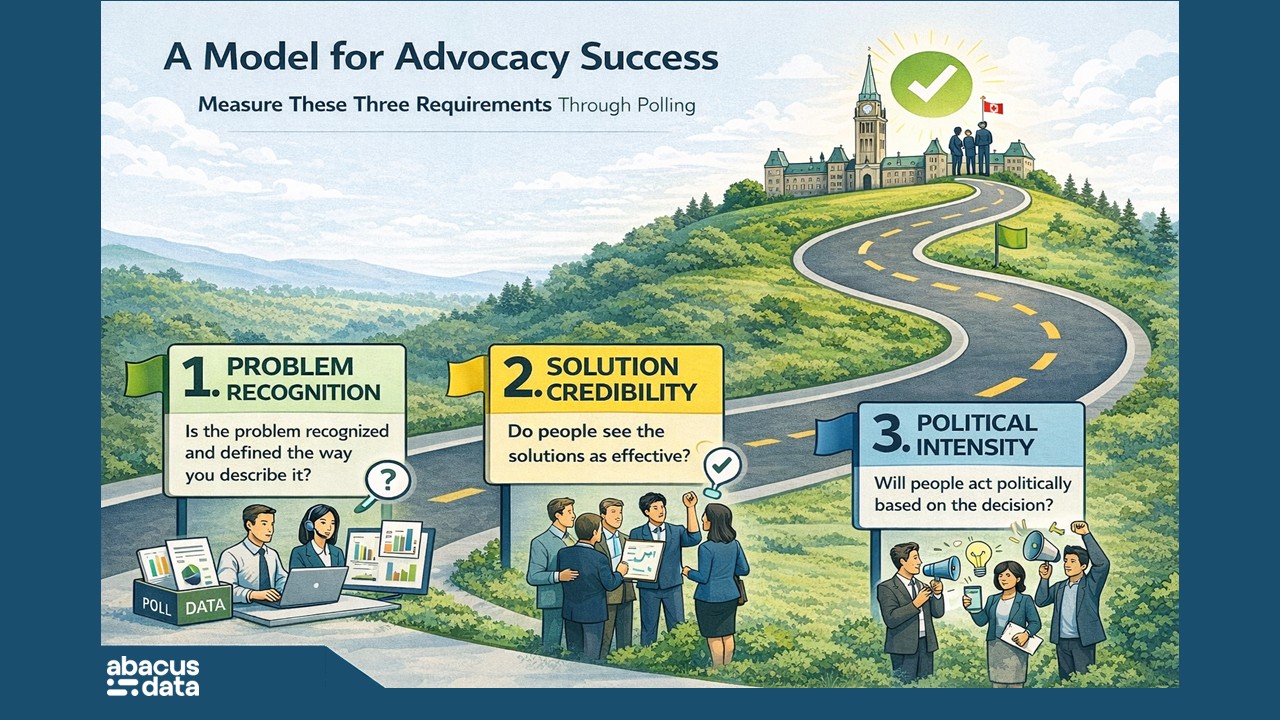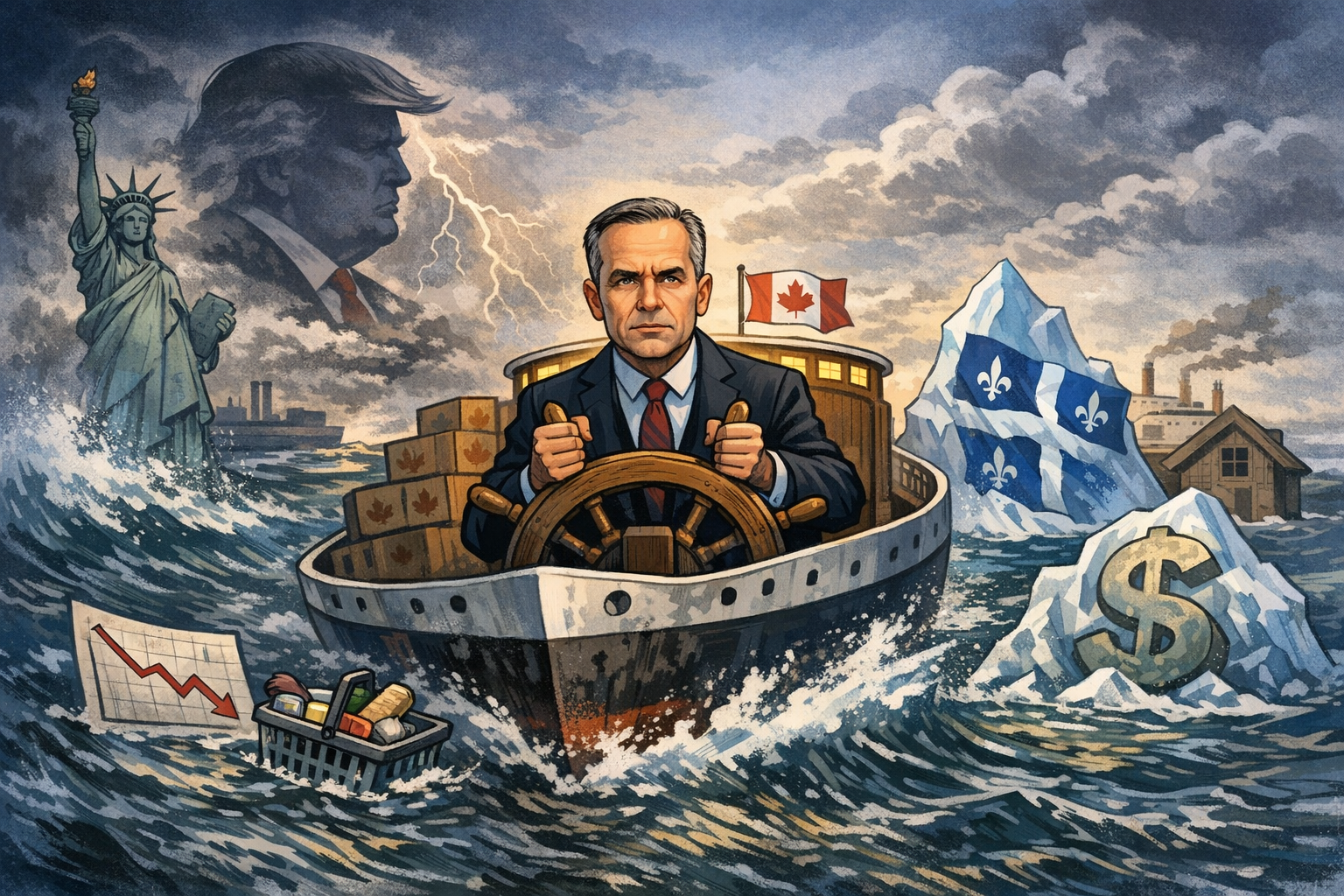What do Canadians think about climate change and climate action?
October 28, 2021
As the 2021 United Nations Climate Change Conference, also known as COP26, kicks off this weekend in Glasgow, I thought it would be worthwhile to take a measure of Canadian public opinion towards climate change. To track opinions, I asked a series of questions we have fielded over the past few years on our most recent national omnibus survey.
Here’s what our survey of 2,200 Canadians (conducted from October 15 to 20, 2021) found:
TWO-THIRDS BELIEVE THERE IS SOLID EVIDENCE THAT THE EARTH IS WARMING
Almost all Canadians believe there is at least some evidence that the earth is warming, including 69% who say there is either conclusive or solid evidence that the average temperature on earth has been getting warmer over the past few decades.

This view is shared widely across demographic groups and across the country. Even in Alberta, a majority believe there is solid evidence that climate change is happening.

And this view has increased since September 2015. Back then, 65% believed there was at least solid evidence representing a 4-point increase in the past six years. More importantly, those believing that there is “conclusive evidence” that the earth is warming have increased 8-points – from 29% to 37%.

At the same time, more Canadians believe that global warming is being caused by human activity. In 2015, 71% felt global warming was being caused by human activity. Today, it’s 75%.

WHY SHOULD WE COMBAT CLIMATE CHANGE?
When asked to rank four possible reasons why we need to do more to combat climate change, responses remain quite mixed.
Some (30%) believe we have a moral responsibility to pass on a planet that is safe and healthy to the next generation. A similar proportion (29%) believe fighting climate change by shifting to more efficient energy use will bring new economic opportunities for Canadians.
Another 1 in 5 think the best reason is that the strongest economies in the future will be those that transition to using more renewable energy and Canada shouldn’t fall behind while a similar number think that extreme weather events have become a financial disaster that we need to avoid.
Since 2018, views have shifted somewhat. Today, more people see the economic benefits of fighting climate change in terms of clean technology and the impact of extreme weather disasters.
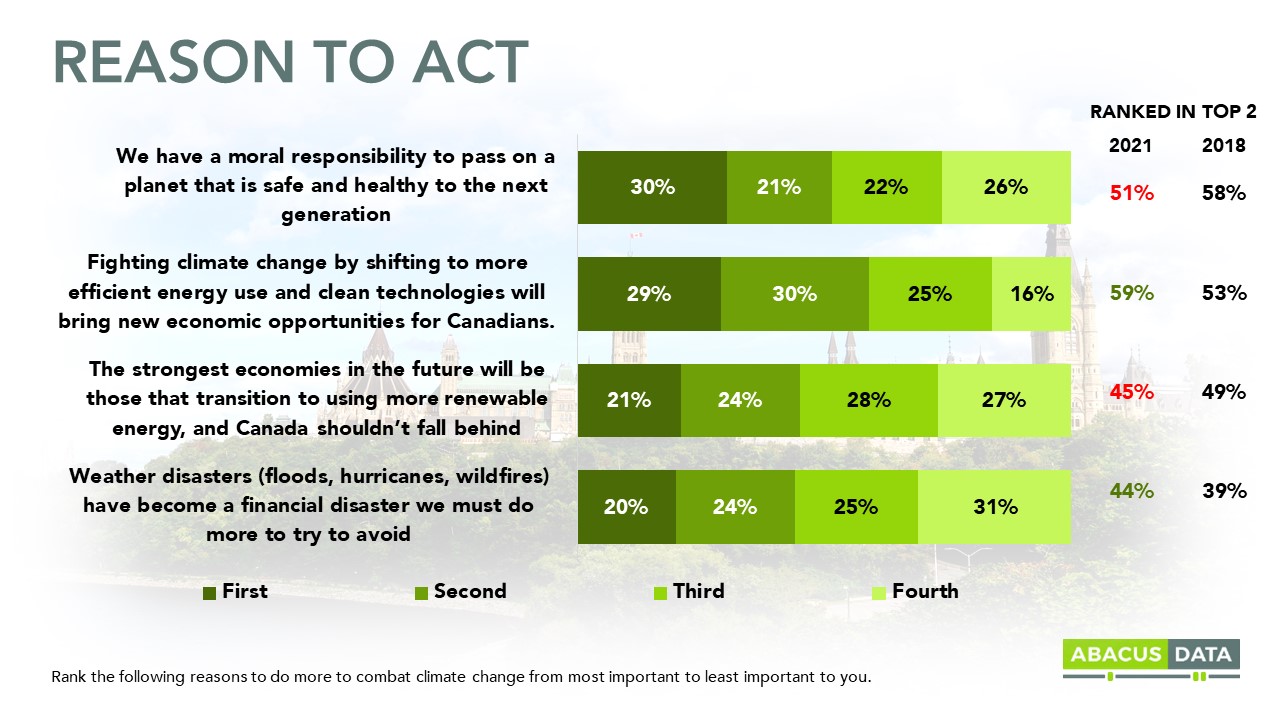
TWO-THIRDS WANT TO SEE GOVERNMENTS DO MORE TO REDUCE EMISSIONS
Despite efforts by governments to reduce emissions, most Canadians want to see governments do more. 66% would like to see governments in Canada put more emphasis on reducing emissions, 15% want to see less done and 19% think the current trajectory is sufficient.
These views have remained relatively consistent over the past half-decade, despite more focus and effort by governments at all levels of government. Back in September 2015, 69% wanted to see more emphasis on reducing emissions. Today it’s 66%.

Regionally, a majority want to see governments do more in every region except for Alberta. But even in Alberta, by almost a 2 to 1 margin residents want more emphasis on climate change than less.
There’s also fairly widespread political consensus. Almost 8 in 10 of those who voted Liberal, NDP, or Green in 2021 want to see governments do more whereas Conservative Party supporters are more divided. That being said, even among Conservative voters, 44% want to see more emphasis from governments while 24% want to see less.

WHAT’S THE BEST WAY TO REDUCE EMISSIONS?
When asked to rank approaches governments can take to reduce emissions, Canadians are more likely to prefer rules and regulations that require emissions reductions and subsidies to encourage the adoption of low-carbon technologies. Carbon pricing is less likely to be ranked high but there has been a shift in views.
Back in 2018, only 13% ranked carbon pricing as their most preferred approach. Today, 20% feel it is the best way to reduce emissions, a shift of 7-points in 3 years.
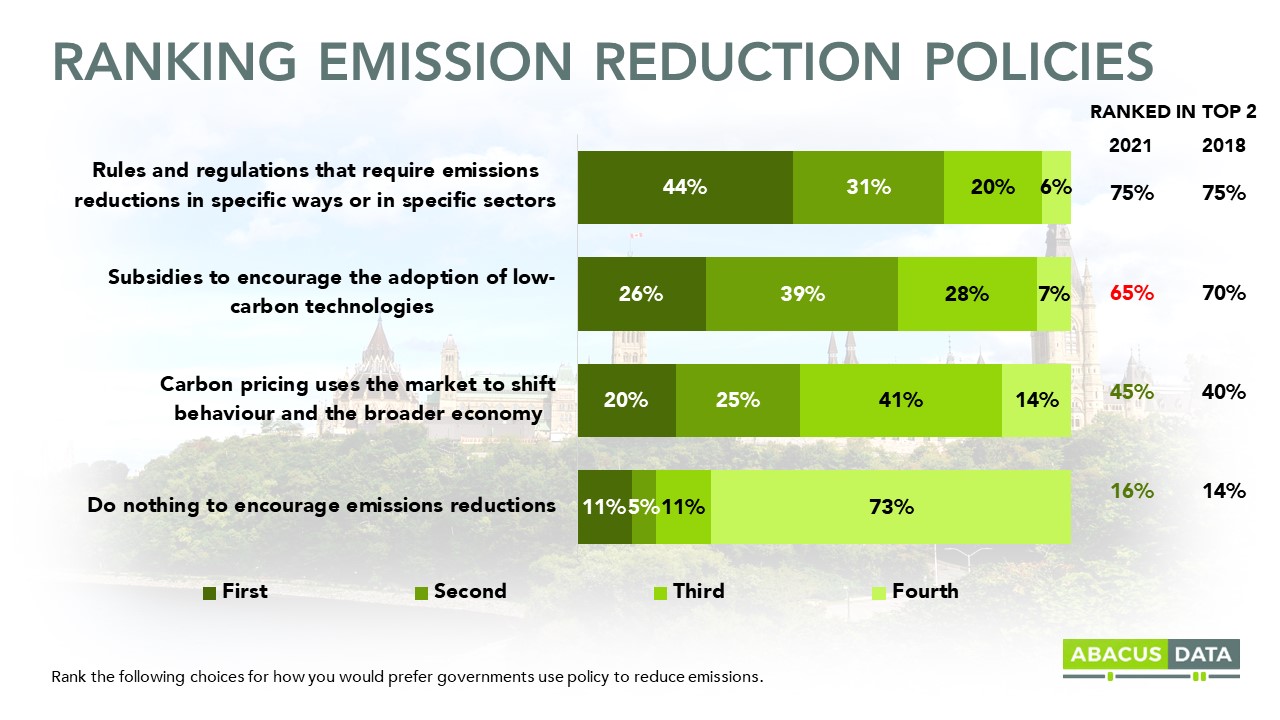
VIEWS ON DEVELOPING CANADA’S OIL & GAS RESOURCES
Canadians are divided on whether Canada should or should not develop its oil and gas resources. 51% think we need to take measures to greatly slow or stop the development and transmission of oil and gas to meet emissions reduction targets while 49% think Canada should continue to develop its oil and gas resources.
But views on this question have shifted since 2018. Back then, 60% felt we should develop those resources while 40% thought we shouldn’t. In 3-years, that’s an 11-point swing in favour of slowing or stopping the development of our oil and gas resources.
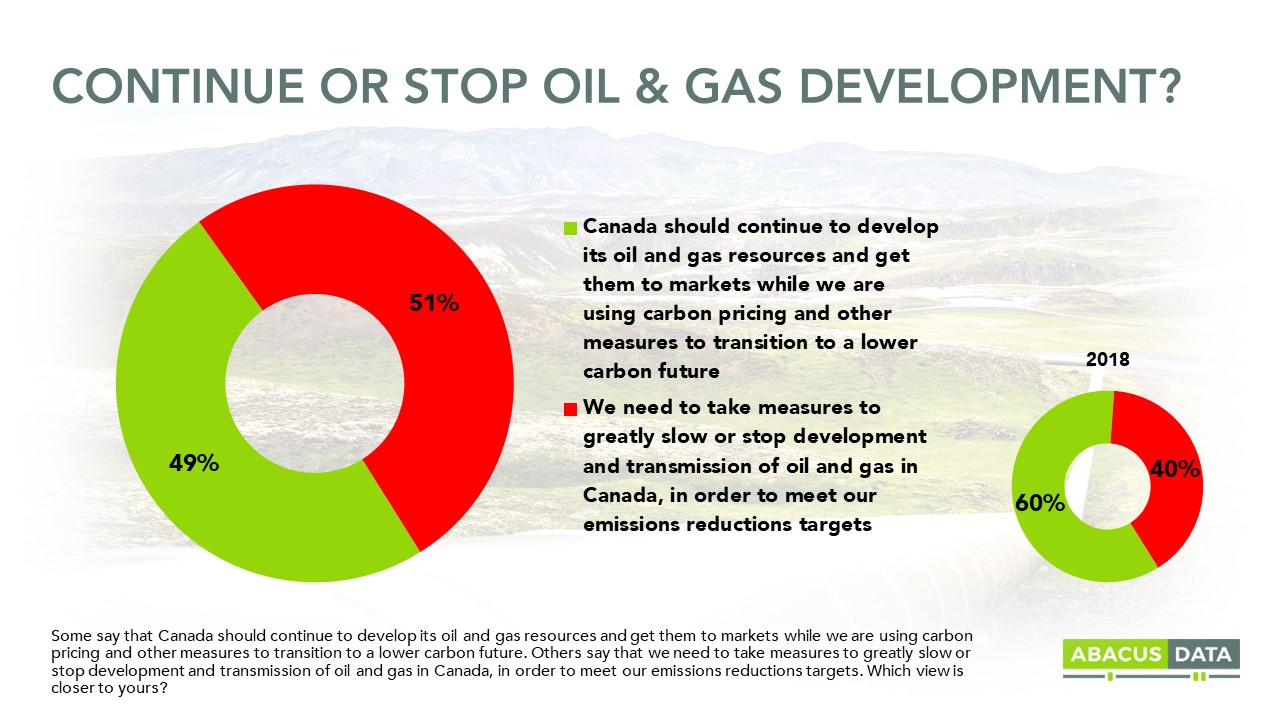
Regionally, half or more think oil and gas development needs to be slowed or stopped in BC, Ontario, Quebec, and Atlantic Canada. Only 32% feel this way in Alberta.
Politically, 2 in 3 Conservative voters think oil and gas development should continue while a similar proportion feels the opposite among NDP and Green Party voters. Among those who voted Liberal in 2021, about half think development should slow or stop while about half feel it should continue.
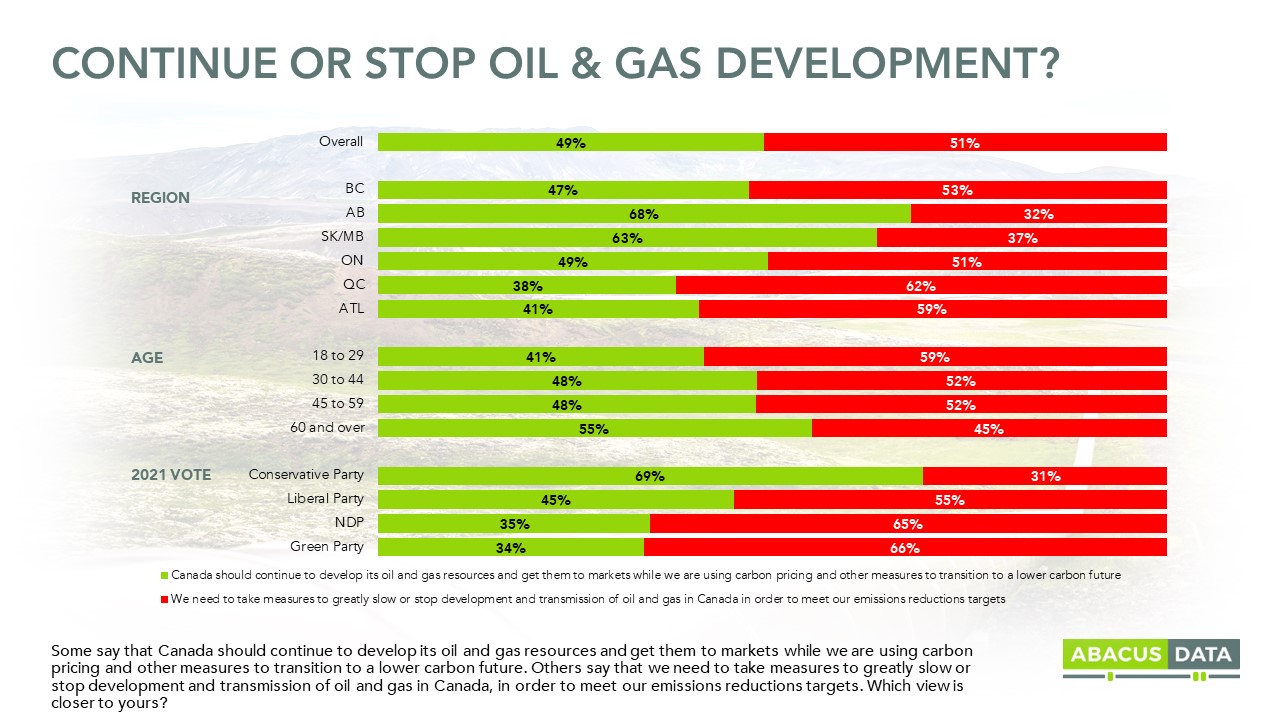
UPSHOT
As the world gathers to coordinate efforts to combat climate change, Canadian public opinion has shifted. More people think there’s conclusive evidence that climate change is happening. Three in four understand that human activity is causing climate change and two-thirds want governments to do more.
But there is less consensus on the approach public policy should take. Canadians are divided both regionally and politically on whether we should develop our oil and gas reserves.
More frequent and severe weather events continue to put a spotlight on the impacts of climate change. Consumers are becoming more open and interested in zero-emission vehicles and are looking for ways to reduce their own emissions.
But strong leadership is still required to unite Canadians behind a plan to get to net-zero. The public is there, waiting to be led.
METHODOLOGY
The survey was conducted with 2,200 Canadian adults from October 15 to 20, 2021. A random sample of panelists was invited to complete the survey from a set of partner panels based on the Lucid exchange platform. These partners are typically double opt-in survey panels, blended to manage out potential skews in the data from a single source.
The margin of error for a comparable probability-based random sample of the same size is +/- 1.9%, 19 times out of 20.
The data were weighted according to census data to ensure that the sample matched Canada’s population according to age, gender, educational attainment, and region. Totals may not add up to 100 due to rounding.
This survey was paid for by Abacus Data Inc.
Abacus Data follows the CRIC Public Opinion Research Standards and Disclosure Requirements that can be found here: https://

ABOUT ABACUS DATA
We are the only research and strategy firm that helps organizations respond to the disruptive risks and opportunities in a world where demographics and technology are changing more quickly than ever.
We are an innovative, fast-growing public opinion and marketing research consultancy. We use the latest technology, sound science, and deep experience to generate top-flight research-based advice to our clients. We offer global research capacity with a strong focus on customer service, attention to detail and exceptional value.
We were one of the most accurate pollsters conducting research during the 2021 Canadian election following up on our outstanding record in 2019.
Contact us with any questions.
Find out more about how we can help your organization by downloading our corporate profile and service offering.

